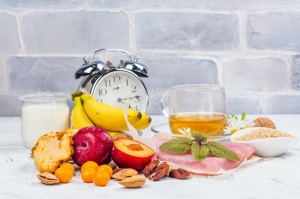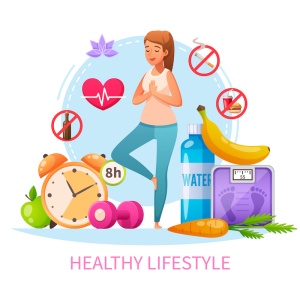
If you are having trouble sleeping, you’re not alone. We are experiencing an epidemic of sleep deprivation and insomnia. Stress, anxiety, over-stimulation from constant connection to digital devices have all been identified as factors. Is it possible that what and when we eat can affect how well or poorly we sleep?
Let’s examine specific nutrients and foods essential for quality sleep.
Meal timing

Our bodies are designed to eat during daylight and sleep at night. When we snack and/or eat before going to bed, our body must split its energy between digestion and what the brain does during sleep, leading to poor sleep quality. Additionally, the body has no need for those calories and is inclined to store them as fat.
Dietary fiber

Known as roughage or bulk, fiber is a key to a good night’s sleep. A 2016 study found that a diet low in dietary fiber and high in saturated fat and sugar is associated with lighter, less restorative, and more disrupted sleep. Greater fiber intake resulted in more time spent in the stage of deep, slow wave sleep. “Our main finding was that diet quality influenced sleep quality,” said principal investigator Marie-Pierre St-Onge, PhD, assistant professor in the department of medicine and Institute of Human Nutrition at Columbia University Medical Center in New York, N.Y.
Unlike fats, proteins, and carbohydrates, which the body breaks down and absorbs, the body is unable to digest fiber. It passes through the stomach, small intestine and colon and out of the body relatively intact. Dietary fiber is classified as soluble, which dissolves in water, and insoluble, which does not.
Soluble fiber helps regulate blood cholesterol and blood glucose levels. It is found in oats, peas, beans, apples, citrus fruits, barley, and psyllium. Insoluble fiber promotes movement of material through the digestive system and increases stool bulk, allowing regular bowel movements and preventing constipation. It is found in whole grains, wheat bran, nuts, seeds, beans, legumes, cauliflower, green beans, and potatoes.

Folate
Optimal levels of folate (Vitamin B-9) are linked to lower rates of insomnia and decreased restless leg syndrome. Folate helps you feel sleepy at bedtime and more resilient in the face of sleep disturbances. Folate is found mainly in dark green leafy vegetables, beans, peas and nuts. Folic acid is the synthetic form of folate.
Isoflavones

Plants create hormones, known as isoflavones, which are similar in function to the hormones created by animals. A 2015 Japanese study of over 1,000 participants found higher isoflavone intake resulted in better sleep duration and better sleep quality. Isoflavones are only found in plants. Soybeans have the highest concentration, but chickpeas, fava beans, lima beans, lentils, flaxseeds, pistachios, peanuts, raisins, and currents are also excellent sources.
Isoflavones are important for more than our sleep. Isoflavones have been found to prevent osteoporosis, improve immune function, and maintain menopausal health in women. Isoflavones exhibit antioxidant, anticancer, antimicrobial, and anti-inflammatory properties.
Magnesium

Magnesium is an essential mineral. Low levels of magnesium have been associated with poor sleep quality, poor sleep efficiency, difficulty falling asleep, and insomnia. Magnesium deficiency is also related to anxiety and depression, both of which contribute to inability to fall and stay asleep. Magnesium supports muscle and nerve function, helps regulate blood pressure and the immune system, and is important in over 300 enzyme reactions in the body.
Foods rich in magnesium are dark leafy greens (kale, spinach, Swiss chard, collard greens, beet greens, etc.), avocados, cashews, almonds, pumpkin seeds, flaxseeds, sesame seeds, lentils, chickpeas, black beans, soybeans, peas, whole grains, dark chocolate, bananas, and fatty fish.
Melatonin

Melatonin is a hormone produced by our pineal gland. Melatonin is our sleep regulator. It helps regulate circadian rhythms of our internal clocks. Melatonin increases as night falls so we can become sleepy and decreases with sunlight so we can awaken. We need melatonin for healthy sleep patterns of sleepiness and wakefulness. Foods rich in melatonin are nuts, mushrooms, whole grains, black rice, germinated legumes and seeds, grapes, tart cherries, strawberries, tomatoes, and peppers.
Tryptophan

Tryptophan is an essential amino acid that cannot be produced by our bodies and must be obtained through our food. Our bodies require tryptophan to produce melatonin and serotonin, the “feel good” hormone. Tryptophan is vital for a wide variety of metabolic functions affecting mood, cognition, and behavior. Foods high in tryptophan are oats, legumes/beans,(especially soybeans), tofu, peanuts, pumpkin seeds, sesame seeds, fish, turkey, cheese, eggs, chicken, and lean meats.
The Bottom Line

Deep, restorative, restful sleep requires a variety of foods and nutrients. It becomes obvious that diet is a critical factor in the quality, duration, and restfulness of sleep. A diet low in saturated fat and sugar and high in plant-based, whole foods is the pathway to quality sleep.
